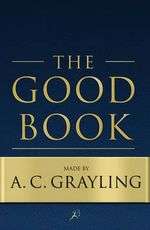The Good Book (book)
 | |
| Author | A.C. Grayling |
|---|---|
| Country | United Kingdom, United States |
| Language | English |
| Subject | Secularism, Humanism |
| Publisher | Walker & Company |
Publication date | 2011 |
| Media type | Print (hardcover) |
| ISBN | 978-0-8027-1737-5 |
| Followed by | The God argument |
The Good Book is a book by A. C. Grayling. It was published in March 2011 by Walker & Company (a US imprint of Bloomsbury) with the subtitle A Humanist Bible, and in April 2011 by Bloomsbury with the subtitle A Secular Bible.
The book was designed as a secular alternative to religious text, and to be read as a narrative drawing on non-religious philosophy, including that from Ancient Greek, Chinese, Roman, Indian and Arab civilizations, as well as the European Renaissance and the Enlightenment. The book also contains a summary of scientific discoveries from the 19th century to the present day.
Structure
The Good Book's organizational system is similar to that of the Bible. It is divided into fourteen books (Genesis, Wisdom, Parables, Concord, Lamentations, Consolations, Sages, Songs, Histories, Proverbs, The Lawgiver, Acts, Epistles, and The Good). Each book is divided into short chapters, and each chapter is divided into numbered verses, so that chapter and verse can be referenced numerically.
The volume's final book features a version of the Ten Commandments (The Good 8:11):
- Love well
- Seek the good in all things
- Harm no others
- Think for yourself
- Take responsibility
- Respect nature
- Do your utmost
- Be informed
- Be kind
- Be courageous
These come with the post-thought that the reader "at least, sincerely try" and an addendum in (The Good 8:12), "Add to these ten injunctions, this: O friends, let us always be true to ourselves and to the best in things, so that we can always be true to one another."
Editions
- The Good Book: A Humanist Bible. New York: Walker, 2011. ISBN 978-0-8027-1737-5.
- The Good Book: A Secular Bible. London: Bloomsbury, 2011. ISBN 978-0-7475-9960-9.
- The Good Book: A Secular Bible. Revised Version. London: Bloomsbury, 2016. ISBN 978-1-4088-7134-8.
Reception
The book received a variety of different reviews. Writing in the Evening Standard, David Sexton described the book as: "unreadable, not merely just because it is boring but because it is nauseating".[1] A.N. Wilson, writing in The Spectator, described the book as "baffling".[2] Wilson questioned the need for a 'secular Bible' and the number of writers attributed within the work who were notably religious in outlook. Genevieve Fox, writing in the Telegraph, found the book "unconvincing",[3] while Christopher Hart, writing in the Sunday Times concluded that: "Compared to the original, it’s a molehill at the foot of Everest".[4] Reviews in The Observer[5] and Private Eye satirised the book for its arbitrary rejection of religious content and the proselytising of the author. It received a positive review in the Sunday Express - where Terry Waite praised it "as a source for inspiration and wisdom".[6] A review in the Irish Independent concluded that "to try to compose a secular bible is itself a well-intentioned undertaking. But can it ever have anything like the influence of the Bible...no".[7] Writing in First Things, R.J. Snell notes that Grayling's book, which draws its form and arrangement from religious authors, ignores the actual writings of religious authors: "A collection including Virgil but not Dante, Cicero but not Augustine, Aristotle but not Maimonides, Livy but not Boethius, Kant but not Kierkegaard, and Goethe but not Dostoyevsky is a truncated selection, especially when the standard for exclusion is some supposed taint by religion."[8]
Grayling discussed The Good Book with the Archbishop of Canterbury, Rowan Williams, before a large audience on London's South Bank, and with Richard Holloway, former Bishop of Edinburgh, at the 2011 Edinburgh Book Festival. In a YouTube video at the Sydney Writers Festival, Grayling responded to criticisms of the Good Book stating, "some of the reviews have been hysterically hostile".[9]
References
- ↑ http://www.thisislondon.co.uk/lifestyle/article-23938503-the-king-james-bible-bashers.do
- ↑ http://www.spectator.co.uk/books/6915428/when-wailing-is-appropriate.thtml
- ↑ http://www.telegraph.co.uk/news/religion/8428011/The-Good-Book-cant-be-bettered.html
- ↑ http://www.theomnivore.co.uk/Book/Classification/Non_fiction/Genre/Religion_Spirituality/7068-The_Good_Book/Default.aspx
- ↑ Richard Holloway, "The Good Book: A Secular Bible by AC Grayling – review", Observer, 24 April 2011. Accessed 1 August 2011.
- ↑ Terry Waite, "Review: The Good Book by AC Grayling", express.co.uk, 17 April 2011. Accessed 1 August 2011.
- ↑ http://www.independent.ie/entertainment/books/review-the-good-book-a-secular-bible-by-ac-grayling-2678606.html
- ↑ http://www.firstthings.com/article/2011/11/amiable-atheism
- ↑ https://www.youtube.com/watch?v=WuxuQO7beYw&list=FLF6CPFJd9sFRd_rDZEEudEg
External links
- Page about The Good Book, bloomsbury.com.